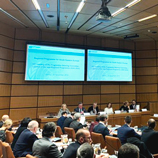 Vienna (Austria), 29 November 2019 - The United Nations Office on Drugs and Crime (UNODC) Regional Programme for South Eastern Europe (2020-2023) was launched today at the 10th meeting of the Programme's Steering Committee in Vienna.
Vienna (Austria), 29 November 2019 - The United Nations Office on Drugs and Crime (UNODC) Regional Programme for South Eastern Europe (2020-2023) was launched today at the 10th meeting of the Programme's Steering Committee in Vienna.
UNODC's overall objectives in the region are to reduce transnational organized crime and related threats, increase safety and expand coverage of treatment and prevention of drug use and dependence. It also aims to promote just, peaceful and inclusive societies in line with the broader EU accession priorities as well as the 2030 Agenda for Sustainable Development.
The meeting opened with remarks from UNODC Executive Director Yury Fedotov, in which he pointed out the strategic importance of South Eastern Europe in the work of UNODC in the regional and international contexts linked to contemporary global challenges.
Mr. Fedotov said: "The Regional Programme stands as an example of how much can be achieved through effective partnerships and with UNODC's integrated support to the implementation of relevant conventions and treaties. And this further helps with other national priorities in these countries. Our "One UNODC" response brings together global, regional and thematic operations, ensuring coordination and an optimized use of resources. The effectiveness of our operations is further guaranteed by our reliance on independent evaluation to inform and improve our programmes."
The UNODC Regional Programme for South Eastern Europe (2020-2023) was developed with the Governments of the region to ensure national ownership and maximum impact. It aims to deliver outcomes through targeted, integrated work in three sub-programmes: (1) Support to law enforcement, enhanced border security and related topics; (2) Strengthening the fight against organized crime and countering illicit financial flows; (3) Drug use prevention and treatment of drug use disorders, and a cross-cutting pillar (4) on strengthening research capacity, policy and monitoring, with respect for human rights and a gender perspective, as well as co-operation with civil society, and other emerging thematic areas.
The Programme aims to meet the specific national needs of the countries in the region, articulated in an inclusive, participatory process, while also ensuring that national activities are part of a coordinated, harmonized regional and inter-regional approach in line with UNODC global principles and the 2030 Agenda for Sustainable Development.
The launch event was complemented by the presentation of the outcome of a new UNODC regional report produced under the EU-funded regional UNODC project "Measuring and assessing organized crime in the Western Balkans (MACRO)". The report describes the trends and patterns observed through collected data and proposes evidence-based policy advice to support developments in the rule of law, implementation of Sustainable Development Goal (SDG) 16.4 and further the EU accession process of the addressed jurisdictions.
The event was attended by the members of the Steering Committee, Ambassadors and senior representatives from the countries of the region, including Albania, Bosnia and Herzegovina, Montenegro, North Macedonia and Serbia, partner countries and the donor community supporting the UNODC work in the region.
Among the senior European Union representatives were officials of the Directorate-General for Neighbourhood and Enlargement Negotiations ( DG NEAR), the European Union Agency for Law Enforcement Cooperation (EUROPOL), the European Border and Coast Guard Agency (FRONTEX), the European Monitoring Centre for Drugs and Drug Addiction (EMCDDA). Regional and international organizations attending the event included the International Criminal Police Organization (INTERPOL), the Organization for Security and Cooperation in Europe (OSCE) and the Police Cooperation Convention for Southeast Europe Secretariat (PCC SEE) among others. The UN Resident Coordinator in Serbia and the Head of the UN Resident Coordinator's Office in Montenegro also attended the event. The broad representation of these and other partners allowed for the strategic exchange of views in the context of the new UNODC Regional Programme and the outlook for the future.